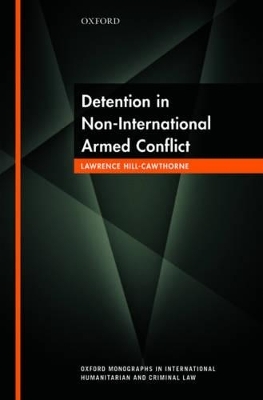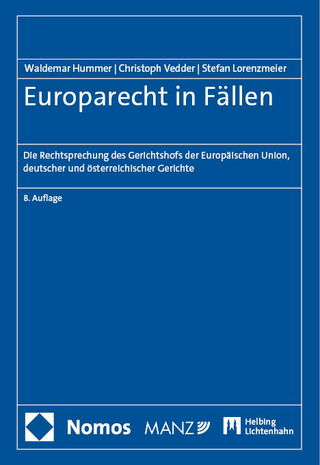
Detention in Non-International Armed Conflict
Seiten
2016
Oxford University Press (Verlag)
978-0-19-874992-9 (ISBN)
Oxford University Press (Verlag)
978-0-19-874992-9 (ISBN)
Detention under international law is highly regulated, but the law appears to be silent on non-international armed conflicts. This book uses case studies to examine the extent to which international humanitarian law can be applied in non-international contexts, and sets out a concrete proposal for how the law might develop in this area.
International law has long differentiated between international and non-international armed conflicts, traditionally regulating the former far more comprehensively than the latter. This is particularly stark in the case of detention, where the law of non-international armed conflict contains no rules on who may be detained, what processes must be provided to review their detention, and when they must be released. Given that non-international armed conflicts are now the most common form of conflict, this is especially worrying, and the consequences of this have been seen in the detention practices of states such as the US and UK in Iraq and Afghanistan.
This book provides a comprehensive examination of the procedural rules that apply to detention in non-international armed conflict, with the focus on preventive security detention, or 'internment'. All relevant areas of international law, most notably international humanitarian law and international human rights law, are analysed in detail and the interaction between them explored. The book gives an original account of the relationship between the relevant rules of IHL and IHRL, which is firmly grounded in general international law scholarship, treating the issue as a matter of treaty interpretation. With that in mind, and with reference to State practice in specific non-international armed conflicts - including those in Sri Lanka, Colombia, Nepal, Afghanistan, and Iraq - it is demonstrated that the customary and treaty obligations of States under human rights law continue, absent derogation, to apply to detention in non-international armed conflicts. The practical operation of those rules is then explored in detail. The volume ends with a set of concrete proposals for developing the law in this area, in a manner that builds upon, rather than replaces, the existing obligations of States and non-State armed groups.
International law has long differentiated between international and non-international armed conflicts, traditionally regulating the former far more comprehensively than the latter. This is particularly stark in the case of detention, where the law of non-international armed conflict contains no rules on who may be detained, what processes must be provided to review their detention, and when they must be released. Given that non-international armed conflicts are now the most common form of conflict, this is especially worrying, and the consequences of this have been seen in the detention practices of states such as the US and UK in Iraq and Afghanistan.
This book provides a comprehensive examination of the procedural rules that apply to detention in non-international armed conflict, with the focus on preventive security detention, or 'internment'. All relevant areas of international law, most notably international humanitarian law and international human rights law, are analysed in detail and the interaction between them explored. The book gives an original account of the relationship between the relevant rules of IHL and IHRL, which is firmly grounded in general international law scholarship, treating the issue as a matter of treaty interpretation. With that in mind, and with reference to State practice in specific non-international armed conflicts - including those in Sri Lanka, Colombia, Nepal, Afghanistan, and Iraq - it is demonstrated that the customary and treaty obligations of States under human rights law continue, absent derogation, to apply to detention in non-international armed conflicts. The practical operation of those rules is then explored in detail. The volume ends with a set of concrete proposals for developing the law in this area, in a manner that builds upon, rather than replaces, the existing obligations of States and non-State armed groups.
Lawrence Hill-Cawthorne is a Lecturer in the School of Law at the University of Reading. Previously he was a Graduate Teaching Assistant in Public International Law at the University of Oxford; Stipendiary Lecturer in Law at Merton College, Oxford; and British Research Council Fellow at the Kluge Center in the Library of Congress, Washington, DC. He holds an LLB from the London School of Economics and BCL, MPhil, and DPhil degrees from the University of Oxford.
PART I: CONTEXT ; PART II: INTERNATIONAL HUMANITARIAN LAW ; PART III: INTERNATIONAL HUMAN RIGHTS LAW ; PART IV: DEVELOPING THE LAW
| Reihe/Serie | Oxford Monographs in International Humanitarian & Criminal Law |
|---|---|
| Verlagsort | Oxford |
| Sprache | englisch |
| Maße | 171 x 240 mm |
| Gewicht | 614 g |
| Themenwelt | Recht / Steuern ► EU / Internationales Recht |
| Recht / Steuern ► Öffentliches Recht ► Völkerrecht | |
| Sozialwissenschaften ► Politik / Verwaltung | |
| ISBN-10 | 0-19-874992-9 / 0198749929 |
| ISBN-13 | 978-0-19-874992-9 / 9780198749929 |
| Zustand | Neuware |
| Informationen gemäß Produktsicherheitsverordnung (GPSR) | |
| Haben Sie eine Frage zum Produkt? |
Mehr entdecken
aus dem Bereich
aus dem Bereich
Die Rechtsprechung des Gerichtshofs der Europäischen Union, deutscher …
Buch | Softcover (2025)
Nomos (Verlag)
39,90 €


